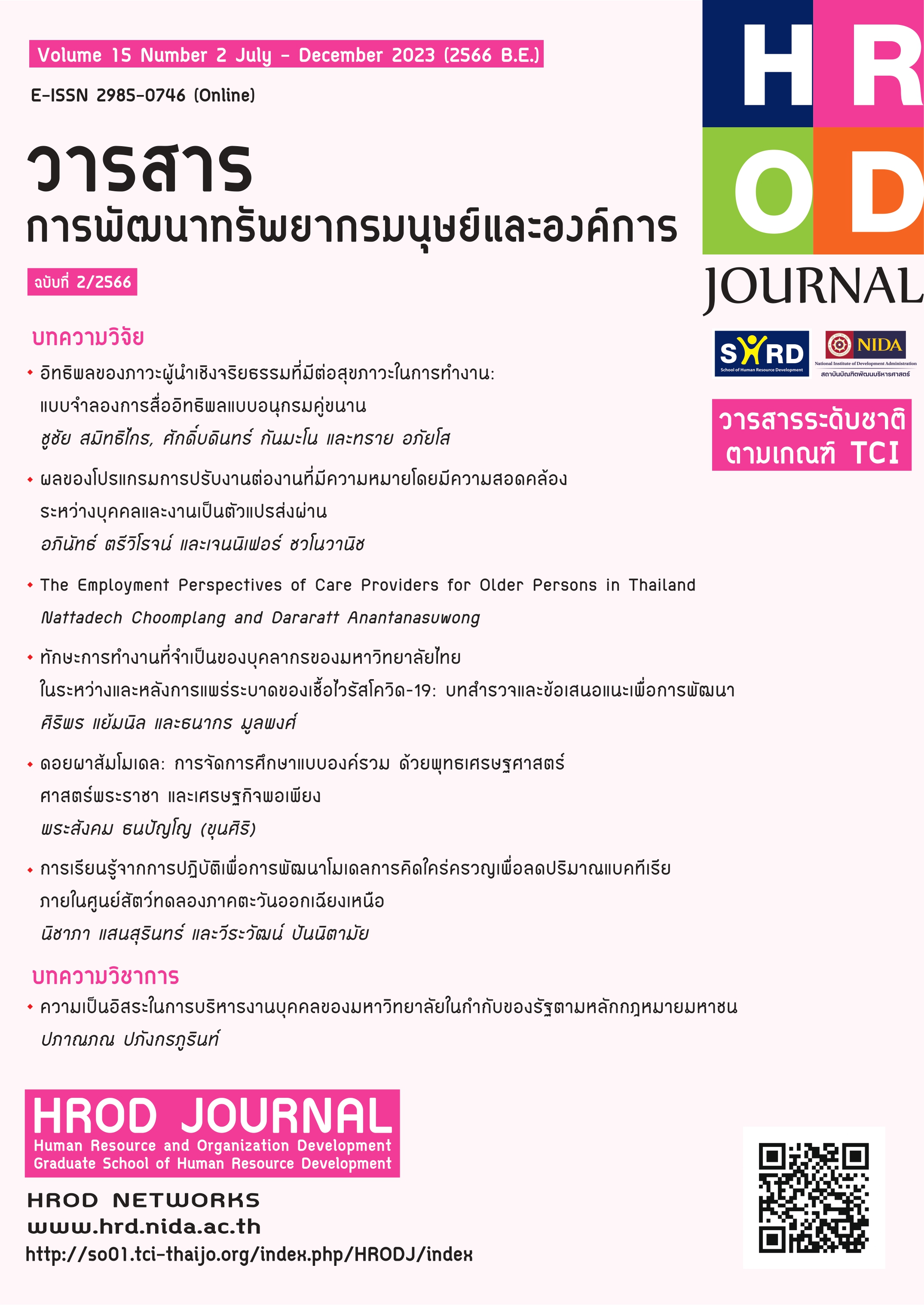An Action Learning Program for Developing a Reflection Model to Reduce the Bacteria Rate in Northeast Laboratory Animal Center
Main Article Content
Abstract
Action learning is a practical learning process via team dialogue for individual, team, and organizational development. One of its key components is a critical reflection among learning set members. Animal rooms of the Northeast Laboratory Animal Center encountered the increasing bacteria level. A three – month action learning program was implemented following with a month-long reflection session. Critical reflection in support of deep learning plays an important role in determining the implementation success of action learning programs. This qualitative research study examined to what extent communicating the predetermined procedures of action learning encourage reflective interactions among the group members. Qualitative data were collected and content analyzed in order to identify characteristics of the reflection and developing a subsequent reflection model. Suggestions for future research studies are mentioned.
Article Details

This work is licensed under a Creative Commons Attribution-NonCommercial-NoDerivatives 4.0 International License.
1) The content of article in HROD journal is the author’s wholly responsibility to research, analyze, summarize, compile, and reference data. The editorial department will not be responsible in anyway.
2) The submitted articles in HROD journal must be unpublished before and must not be currently under consideration for publication elsewhere. If it is detected for its repetition, the author must be responsible for infringement of copyright.
3) Authors will be asked to transfer copyright of the article to the Publisher. The article is prohibited to reproduce all or part of the text, unless allowed.
References
จอมจิน จันทรสกุล. (2553). มาตรฐานการเลี้ยงและใช้สัตว์ทดลอง. วารสารโลหิตวิทยาและเวชศาสตร์บริการโลหิต. 20(4), 297-301.
รัตติกร เหมือนนาดอน. (2562). การพัฒนาการเรียนรู้ผ่านการสะท้อนคิด. วารสารวิจัยสุขภาพและการพยาบาล. 35(2), 13-25.
ลลัลดา ชมโฉม. (2559). การศึกษาปัญหาและการหาวิธีการเพิ่มประสิทธิภาพเกี่ยวกับการดำเนินงาน ด้านเอกสารประกอบการเดินพิธีการกรมศุลกากร (ใบขนขาออก) กรณีศึกษา บริษัทตัวแทนส่งออก สินค้าทางอากาศแห่งหนึ่ง [วิทยานิพนธ์ปริญญามหาบัณฑิต ไม่ได้ตีพิมพ์]. มหาวิทยาลัยบูรพา.
วีระวัฒน์ ปันนิตามัย. (2559). การเรียนรู้จากการปฏิบัติเพื่อการพัฒนา. โรงพิมพ์รัตนไตร.
ศูนย์สัตว์ทดลองภาคตะวันออกเฉียงเหนือ. (2560). รายงานประจำปี 2560 ศูนย์สัตว์ทดลองภาคตะวันออกเฉียงเหนือ. โรงพิมพ์มหาวิทยาลัยขอนแก่น.
เอื้อมพร หลินเจริญ. (2555). เทคนิคการวิเคราะห์ข้อมูลเชิงคุณภาพ. วารสารการวัดผลการศึกษา มหาวิทยาลัยมหาสารคาม, 17(1), 17-29.
Adams, C. L., Nestel, D., & Wolf, P. (2006). Reflection: A critical proficiency essential to the effective development of a high competence in communication. Journal of Veterinary Medical Education, 33(1), 58-64. https://doi.org/10.3138/jvme.33.1.58
Atkins, S., & Murphy, K. (1993). Reflection: A review of the literature. Journal of Advanced Nursing, 18(8), 1188-1192. https://doi.org/10.1046/j.1365-2648.1993.18081188.x
Boud, D., Keogh, R., & Walker, D. (1985). Reflection: Turning experience into learning. Routledge. https://doi.org/10.4324/9781315059051
Edwards, S. (2017). Reflecting differently, new dimensions: Reflection-before-action and reflection-beyond-action. International Practice Development Journal, 7(1), 1-14. https://doi.org/10.19043/ipdj.71.002
Faller, P., Lundgren, H., & Marsick, V. (2020). Overview: Why and how does reflection matter in workplace learning. Advances in Developing Human Resources, 22(3), 248–263. https://doi.org/10.1177/1523422320927295
Faller, P., Marsick, V., & Russell, C. (2020). Adapting action learning strategies to operationalize reflection in the workplace. Advances in Developing Human Resources, 22(3), 291–307. https://doi.org/10.1177/1523422320927298
Gibbs, G. (1988). Learning by doing: A guide to teaching and learning methods. Oxford Brookes University.
Krippendorff, K. (2004). Content analysis: An introduction to its methodology (2nd ed.). Sage.
Marquardt, M. J. (1999). Action learning in action: Transforming problems and people for world-class organizational learning. Dares-Black Publishing.
Marquardt, M. J. (2011). Optimizing the power of action learning: Real-time strategies for developing leaders, building teams and transforming organizations. Hachette.
Moon, J. A. (2004). A handbook of reflective and experiential learning: Theory and practice. Routledge Falmer.
Mortari, L. (2015). Reflectivity in research practice: An overview of different perspectives. International Journal of Qualitative Method, 14(5), 1-9. https://doi.org/10.1177/1609406915618045
Mossop, L. (2020). Reflection and the veterinary profession: A critical challenge for everyone. The Veterinary Record, 186(11), 344-346. https://doi.org/10.1136/vr.m916
National Research Council. (2011). Guide for the care and use of laboratory animals (8th ed.). National Academies Press.
Sandars, J. (2009). The use of reflection in medical education: AMEE Guide No. 44. Medical Teacher, 31(8), 685-695. https://doi.org/10.1080/01421590903050374
Senge, P. M. (2006). The fifth discipline: The art & practice of the learning organization. Random House.


